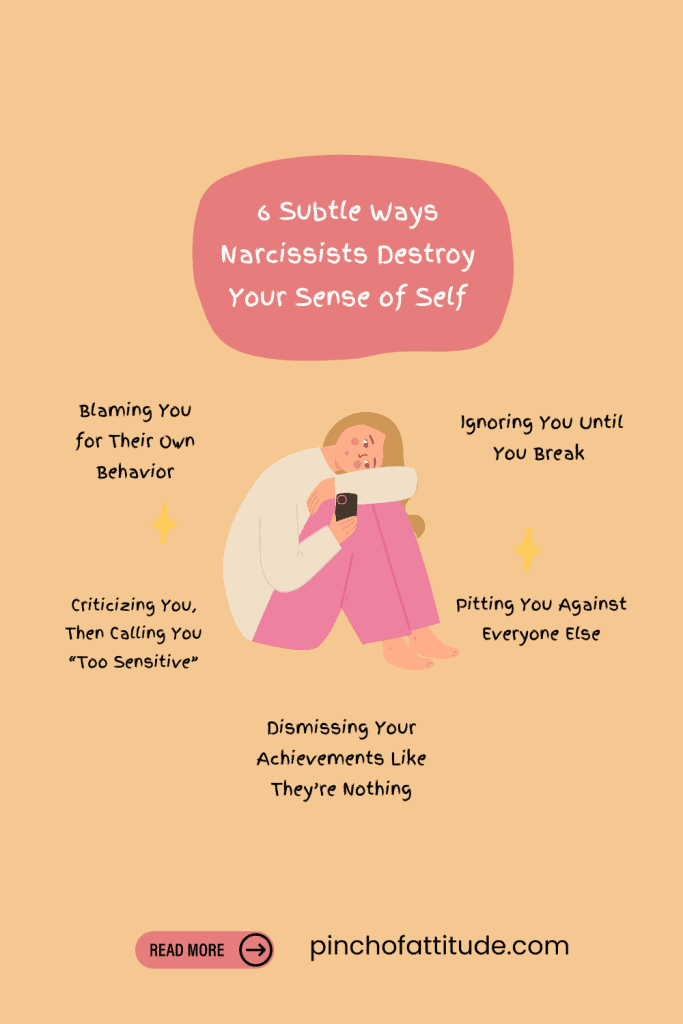Growing up in a toxic family can feel like being in a never-ending episode of emotional Survivor, except the tribe you want to vote off is your family.
Throughout my youth, I learned a lot about how to fend for myself early on, mainly because my narcissistic mom, toxic sister, and brother were too busy playing their own games.
Living in a narcissistic environment sucks!
Over the years, I’ve come to realize that narcissists are masters at eroding your sense of self.
They’re often in sneaky ways you don’t notice until you’re neck-deep in their mind games.
My older sister, who I was once close to, flipped the script once I became more successful than her.
And, just like that, she started doing everything in her power to knock me down a peg.
Sound familiar? If it does, keep reading.
Today, I want to dig deep into the tactics narcissists use to dismantle your confidence piece by piece.
And, more importantly, how you can stop them from messing with your head.
Table of Contents
6 Sneaky Ways Narcissists Destroy Your Sense of Self

Narcissists are experts at using subtle, yet highly effective, psychological tactics to tear down your sense of self-worth.
They don’t come at you with obvious attacks instead, they chip away slowly, leaving you questioning your value, your reality, and your relationships.
I know this all too well from my own toxic family dynamics.
My mom, brother, sister and their flying monkeys all had their own ways of manipulating and controlling.
Whether it was through emotional withdrawal or underhanded comparisons.
If you’ve ever found yourself feeling confused, insecure, or unsure of who you are after being around a narcissist, trust me, you’re not imagining things.
These tactics are designed to make you feel that way.
Here are six sneaky ways narcissists will slowly dismantle your confidence and sense of self.
By understanding these tactics, you’ll be better equipped to recognize them for what they are and protect yourself before they cause any more damage.
1. Ignoring You Until You Break
Narcissists love to punish you by pretending you don’t exist.
It’s called the silent treatment, and it’s the emotional equivalent of someone putting you on mute.
Growing up, my mother was a pro at this.
After any disagreement or when I dared to stand up for myself, she’d go radio silent for days, sometimes weeks.
The silent treatment isn’t about resolving a conflict; it’s about making you feel unworthy of communication and desperate for any sign of approval.
Over time, this tactic makes you feel invisible and unimportant.
You’ll find yourself bending over backward just to get their attention even if it’s negative.
2. Pitting You Against Everyone Else
My toxic mother and older sister loved this move, like too much I think.
Once I started achieving more success in life, she made it her mission to compare me to anyone who, in her eyes, was “better” than me
Whether it was a friend, a colleague, or even some random acquaintance, she was always trying to make me feel like I wasn’t enough.
This tactic is called triangulation, and it’s designed to make you feel insecure and compete for their validation.
The kicker? You never actually win.
They always move the goalposts, so you’re stuck in this constant state of self-doubt.
3. Dismissing Your Achievements Like They’re Nothing
Ever had a moment where you accomplished something you’re really proud of, only for someone to shrug it off like it’s no big deal?
My mother was a master of this. “Anyone could have done that,” she’d say as if my hard work meant nothing.
Narcissists use this tactic to diminish your achievements, making you feel small and inadequate.
The idea is simple: if they downplay your success, you’ll stop believing in yourself.
Eventually, you’ll feel like no accomplishment is worth celebrating.
4. Criticizing You, Then Calling You “Too Sensitive”

Criticism is a narcissist’s favorite weapon, and they know exactly how to make it sting.
But here’s the genius part, they’ll follow up their jabs with something like, “You’re so sensitive” or “I’m just being honest.”
During my childhood, I heard these lines more times than I can count.
My mother, and later my sister, would criticize everything from my appearance to my career and then act like I was overreacting when I stood up for myself.
It’s a mind game that leaves you feeling like your reactions are the problem, not their words.
Over time, you’ll start questioning your emotions and whether you’re just “too sensitive.”
5. Blaming You for Their Own Behavior
Narcissists are experts at dodging responsibility by accusing you of the very things they’re guilty of.
I saw this in my own family, especially with my brother.
If he was acting out or being irresponsible, somehow it was always my fault.
“You’re the problem,” he’d say, even though I was barely involved.
This tactic, known as projection, is their way of shifting the blame onto you, leaving you feeling confused and questioning your actions.
In reality, they’re deflecting attention away from their own shortcomings, and if you don’t catch on, you’ll start to internalize the blame.
6. Making You Question Your Reality
Gaslighting is one of the most insidious tactics narcissists use, and it’s one my mother pulled out often.
“I never said that, you’re imagining things,” she’d tell me, even though I knew what I heard.
Over time, I started to doubt my own memory and perception of reality.
Gaslighting leaves you feeling disoriented and questioning everything. It’s designed to make you dependent on them for what’s “true,” eroding your confidence in your own judgment.
How to Protect Yourself from These Tactics?

Now that we’ve called out the narcissist’s playbook, let’s talk about how to protect yourself.
Because trust me, once you see the game for what it is, you can stop them from controlling your life.
1. Set Boundaries, and Stick to Them
One thing I had to learn was that boundaries aren’t just for other people they’re for me.
Growing up in a household where my mom and siblings trampled over any boundary I tried to set, I quickly realized that the key isn’t just setting them but sticking to them.
A narcissist will test your limits, so you need to be firm.
Whether it’s emotional or physical boundaries, don’t give them an inch. They’ll take a mile.
2. Don’t Ever Take the Bait
One of the hardest lessons I learned is not to engage when they start their games.
My sister, in particular, was great at provoking a reaction out of me.
The moment I stopped taking the bait stopped reacting to every insult or lie she lost her power over me.
Narcissists thrive on your reactions. Starve them of that, and they have nothing.
3. Trust Yourself, No Matter What!

After years of being gaslighted, I had to relearn how to trust myself.
Narcissists will make you doubt your reality, so you have to become your own anchor.
Writing things down helped me a lot.
If they said something and then denied it later, I had proof for myself.
Don’t let them rewrite your reality.
4. Limit or Cut Off Contact If Possible

Going no-contact with my mom and sister was one of the hardest yet most freeing decisions I ever made.
If possible, reduce how much contact you have with the narcissist in your life.
You’re not required to stay in toxic relationships just because you share DNA. Your mental health matters more.
5. Find Your Support System
As I matured, I had to learn how to be independent because I didn’t have much of a support system at home.
Now, I make sure I have people around me who remind me of my worth.
Whether it’s friends, a therapist, or a partner, having people who lift you up can help you rebuild your confidence and sense of self.
6. Educate Yourself

Understanding narcissism was a game-changer for me.
Once I recognized their tactics, it was easier to navigate my relationships with them. E
ducate yourself so you can see through their manipulations and protect your sense of self.
Knowledge is your best defense.
Final Thoughts
If you saw yourself in any of these signs, take a breath, you’re not alone, and you’re not hopeless.
Narcissists are masters at unraveling your identity slowly, quietly, and with just enough confusion to make you think you’re the problem.
But recognizing these tactics is the first step in taking your power back.
You don’t need to rebuild into a version they’d finally approve of.
You get to become someone who no longer needs their validation at all.
That’s what The Next Chapter is here for not just to help you survive the damage, but to help you rediscover who you were before they tried to erase you.
Because the person you were before is still in there.
She just needs space, truth, and healing on her own terms.
And now, you’re finally in the right place to begin that work.
Related Posts:
- 9 Hidden Triggers Narcissists Use to Feed Off Your Reactions
- How Narcissistic Abuse Causes Brain Fog?
- 12 Most Common Lies Narcissists Tell, Translate Into Truth By Experts
- Narcissists Will Do This When They Realize What They Lost (YOU!)
- Why The Anger Stage Is a Very Important Part of Healing From Narcissist Abuse?
Frequently Asked Questions
How do narcissists destroy your sense of self?
Narcissists use manipulation tactics like gaslighting, silent treatment, and criticism to undermine your self-worth and confidence.
What is the best way to protect yourself from a narcissist?
Set clear boundaries and limit contact to protect your emotional well-being.
Why do narcissists give the silent treatment?
The silent treatment is a way for narcissists to control and punish you by withholding attention and communication.
How can you recover after narcissistic abuse?
Recovery involves seeking support, rebuilding your self-esteem, and learning to trust your own instincts again.
Is it possible for narcissists to change their behavior?
Narcissists rarely change their behavior without long-term therapy, and even then, change is often minimal.





